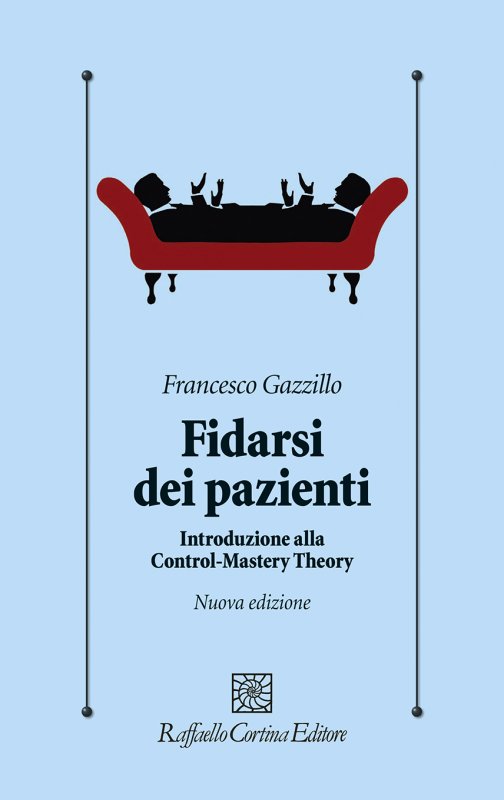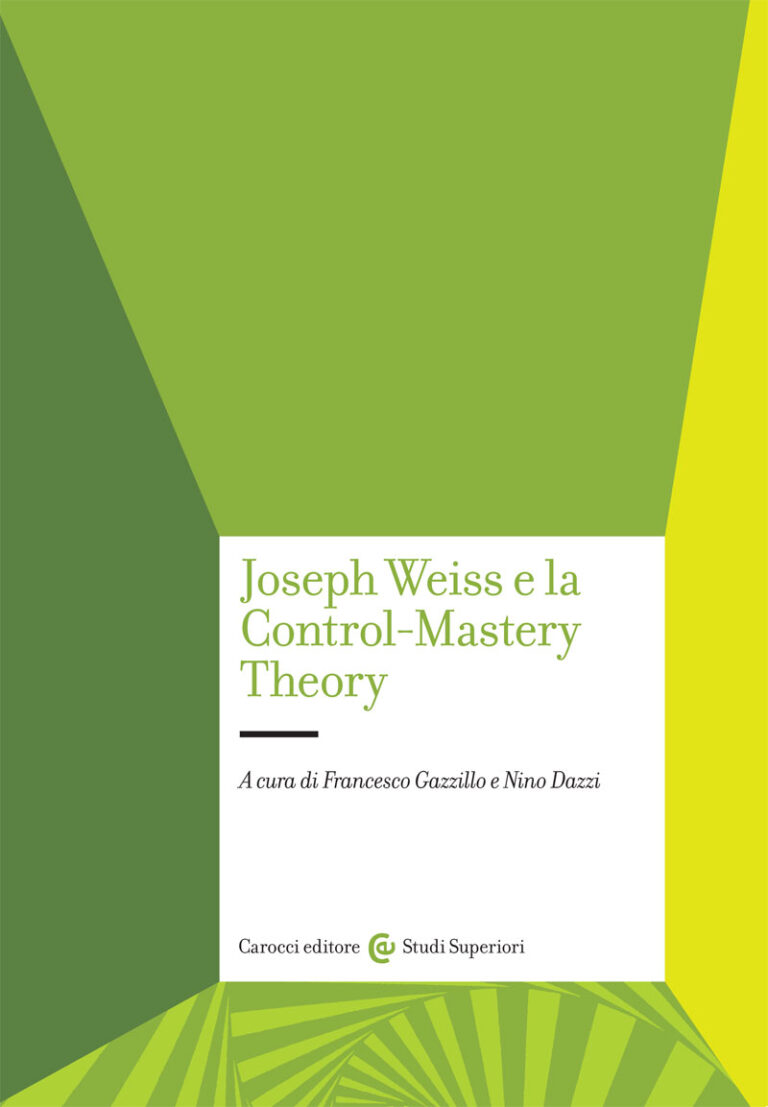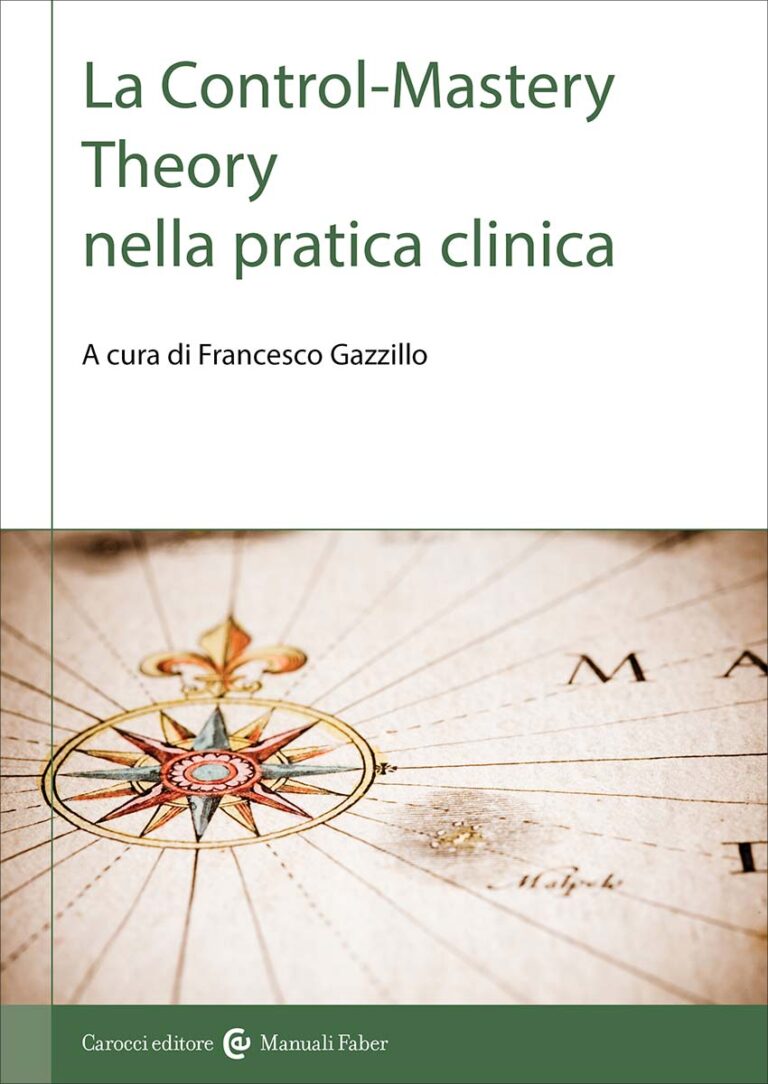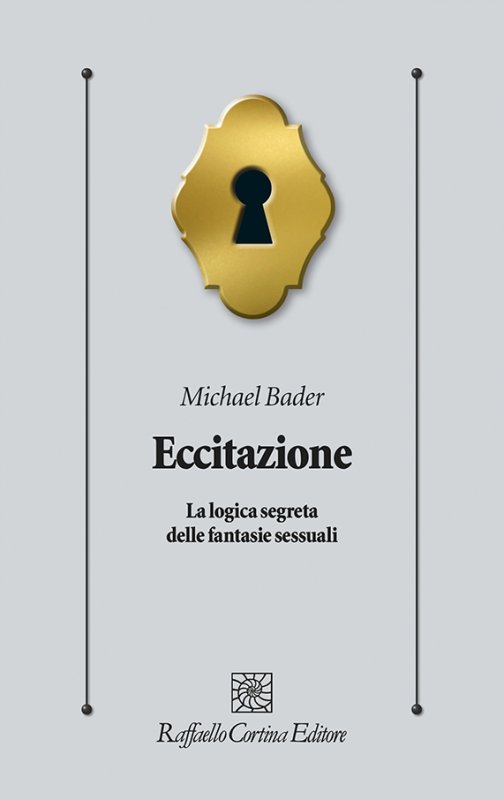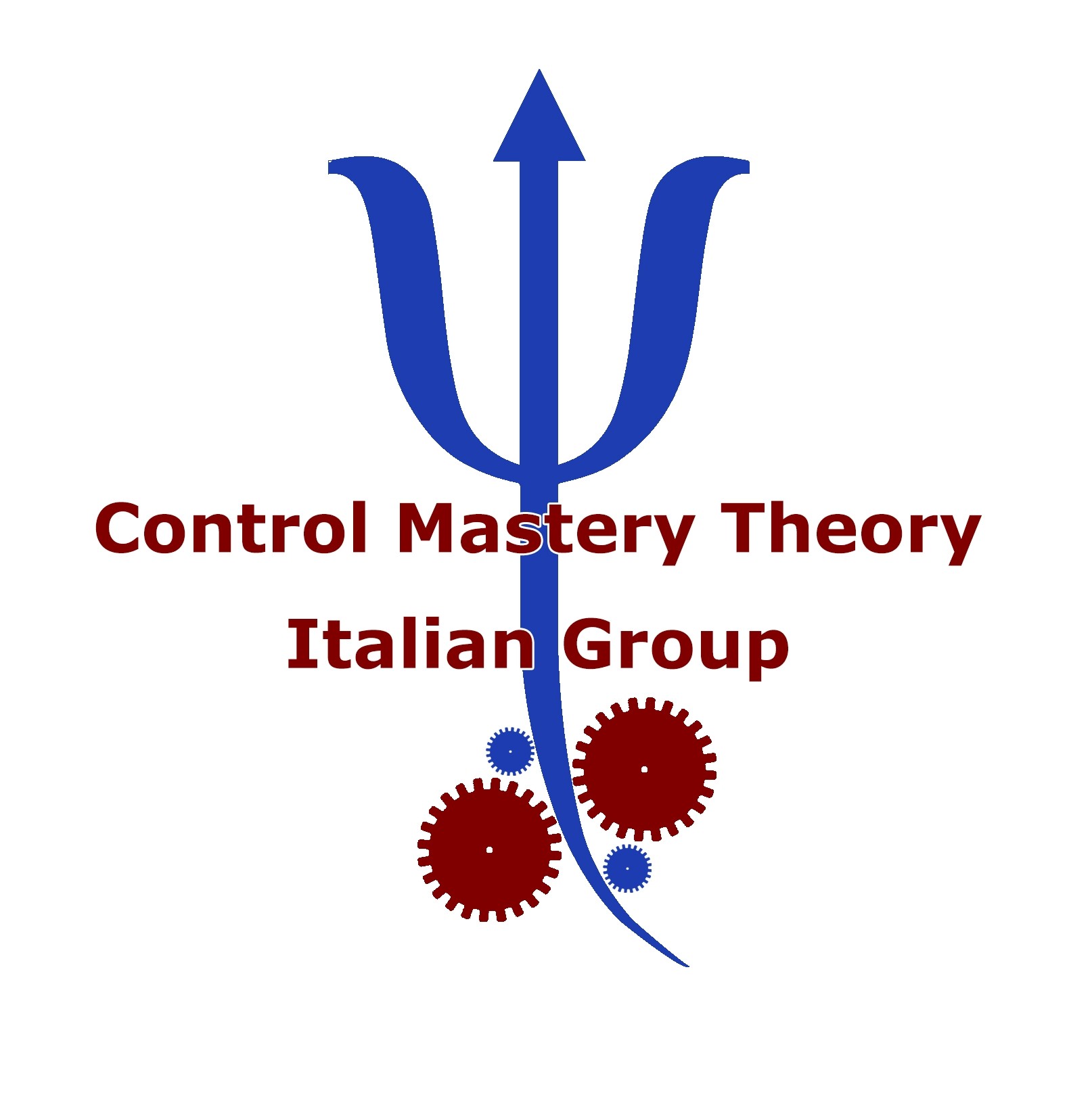
Control-Mastery Theory - CMT
Italian Group
Il Control Mastery Theory Italian Group (CMT-IG) è l'associazione di riferimento in Italia per la diffusione, ricerca e formazione in psicoterapia secondo la Control Mastery Theory.
In Evidenza: Corso Introduttivo CMT 2026
Corso FAD sincrono di 28 ore accreditato per 42 crediti ECM. A partire dall'11 gennaio 2026, un percorso essenziale per psicologi e psicoterapeuti che vogliono padroneggiare i concetti della CMT.
.png)
Aiuta la Ricerca: Orientamento soggettivo ed emozioni prosociali
Stiamo portando avanti un progetto per capire meglio come viviamo colpa e vergogna, due emozioni centrali nella nostra vita quotidiana.
Partecipare è semplicissimo: basta compilare un questionario online. È anonimo e non richiede molto tempo.
Il tuo contributo sarà prezioso per la ricerca!

Ultimi Articoli Scientifici
Le riflessioni che presento si collocano nella scia di un precedente lavoro, in cui era stato posto un quesito rispetto a questo tipo di fenomeni. In particolare, mi riferisco a quelle circostanze, che si verificano in terapia, in cui “la disconferma delle credenze patogene lascia spazio a un nuovo vissuto doloroso: la perdita di quei riferimenti identitari che, per quanto portatori di sofferenza, offrivano un’immagine chiara di sé” (Bruno, 2025). I concetti di vero Sé e Falso Sé, introdotti da Winnicott (vedi, ad esempio, Winnicott, 1965), offrono spunti, a mio avviso, rilevanti per comprendere quei pazienti che, in seguito a un lavoro terapeutico volto a disconfermare le loro credenze patogene e al raggiungimento di obiettivi sani attraverso il superamento dei test, riferiscono di sentirsi vuoti, “dissociati”, lontani dal mondo e dagli altri, persi, confusi o, più genericamente, “in crisi”. Da una prospettiva psicoanalitica, il vero Sé rappresenta il costrutto ipotetico alla base della sensazione di essere sé stessi, di essere autentici, spontanei e creativi, e il suo sviluppo è reso possibile dalla presenza di un ambiente facilitante che, nell’infanzia, è in grado di favorire la continuità del senso di esistere del bambino, il suo abitare il corpo, il suo essere sé stesso e al tempo stesso in relazione con l’ambiente (Winnicott, 1965). Tale ambiente facilitante consente il passaggio da una dipendenza assoluta a una dipendenza relativa, accompagnando gradualmente il bambino nel processo di separazione dalla madre e di acquisizione dell’autonomia. Quando tutto ciò viene meno e i genitori non rispondono in modo adeguato, empatico e contingente ai suoi bisogni, la situazione si complica. Il bambino, infatti, nel tentativo di proteggere il legame con i caregiver, impara precocemente a adattarsi, modificando e distorcendo i propri bisogni, desideri, comportamenti e atteggiamenti per adeguarsi alle aspettative altrui.
L’obiettivo di questo scritto è di illustrare le potenzialità terapeutiche del gruppo alla luce dell’impianto teorico della Control-Mastery Theory, descrivendone le fasi cruciali: la fondazione e l’avvio di un gruppo terapeutico. Si introdurranno inoltre ipotesi e modalità di verifica (mappa del gruppo) legate alla configurazione del piano inconscio individuale all’interno di una dimensione gruppale. La Control-Mastery Theory offre una cornice utile per comprendere ciò che rende un’esperienza terapeutica trasformativa. I suoi fattori terapeutici principali riguardano, da un lato, la possibilità per il paziente di vivere un’esperienza emotivamente correttiva mettendo alla prova—attraverso i test—le proprie credenze patogene e osservandone la disconferma; dall’altro, l’insight, che consente di ricollegare tali vissuti alla propria storia personale, riorganizzandone il significato (Gazzillo, 2021). Perché questo processo possa attivarsi, è fondamentale che la persona percepisca un sufficiente senso di sicurezza, condizione che le permette di ricominciare a lavorare per perseguire i propri obiettivi riducendo l’impatto delle credenze patogene. Partendo da questi presupposti, possiamo chiederci in che modo il lavoro di un paziente all’interno di un gruppo terapeutico possa favorire esperienze emotive correttive. La presenza di molti membri, ognuno con il proprio modo di comunicare e di entrare in relazione, crea un contesto ricco e plurale. Tuttavia, tale pluralità porta con sé delle inevitibili crisi relazionali, un po’ come è stato già osservato all’interno di un contesto di terapia di coppia o familiare (Crisafulli, Rodomonti, 2018). Nella rete di relazioni che andrebbe a generarsi dall’istituzione del gruppo, troviamo che il ruolo della conduzione – in un’ottica di mediazione, contenimento e comprensione dei test relazionali che i pazienti mettono in campo – risulterebbe fondamentale per raggiungere gli insight e gli obiettivi desiderati da ciascuno.
La Control-Mastery Theory (CMT) è una teoria relazionale cognitivo-dinamica del funzionamento mentale, della psicopatologia e del processo terapeutico sviluppata da Weiss e Sampson, dal San Francisco Psychotherapy Research Group e più recentemente dal CMT-Italian Group. I presupposti di base della CMT è che la motivazione principale delle persone è quella di adattarsi al proprio ambiente, di risolvere i problemi che incontrano e a padroneggiare le esperienze avverse e traumatiche. Un ulteriore fondamento teorico della CMT è che il funzionamento psichico sia regolato dalla percezione di sicurezza e di pericolo, e che le persone siano capaci a svolgere in modo inconscio molte delle stesse funzioni adattive che esercitano consapevolmente. Quando all’interno di una relazione un aspetto di sé o i propri bisogni sono esperiti come sicuri, la persona può esprimersi in modo autentico, integrare i propri vissuti affettivi, accedere ai desideri e bisogni e raggiungere i propri obiettivi evolutivi. Al contrario, quando l’ambiente è percepito come minaccioso per l’integrità psichica o per la stabilità delle relazioni significative, l’individuo tende a mettere in atto strategie difensive, inibizioni e compromessi adattivi, spesso inconsci, finalizzati a proteggere sé stesso e i legami affettivi. Un altro aspetto centrale, per la CMT, è che gli esseri umani hanno bisogno non solo di sentirsi al sicuro, ma anche di percepire come al sicuro le persone a cui sono affettivamente legati. Le scelte comportamentali – soprattutto quelle inconsce – sono dunque guidate dalla valutazione del rischio percepito per sé e per gli altri significativi: l’individuo tenderà ad agire solo se ritiene che ciò non comprometta in modo eccessivo la sicurezza relazionale. Infine, la CMT si fonda su una visione prosociale della natura umana: le persone sono viste come fondamentalmente orientate alla costruzione di relazioni cooperative, empatiche e di cura.
La Terapia in Ottica CMT
I pazienti (individui, coppie, famiglie) vengono in terapia perché vogliono raggiungere obiettivi sani e realistici (essere meno depressi, meno ansiosi, riuscire ad avere una storia d'amore appagante, realizzarsi sul lavoro), ma non ci riescono a causa di credenze patogene che gli fanno vivere il raggiungimento di questi obiettivi come un pericolo (possono temere di fallire, di essere rifiutati, di ferire una persona cara ecc.). Queste credenze patogene, in genere inconsce e sviluppate per adattarsi a esperienze traumatiche, alimentano sentimenti di colpa, vergogna e paura, e i pazienti vorrebbero disconfermarle. Nel tentativo di diventare consapevoli di queste esperienze traumatiche e di queste credenze, e di disconfermarle, i pazienti le mettono alla prova proponendo dei test ai loro terapeuti e alle persone care. Il compito del terapeuta è comprendere il piano di ogni paziente (quali obiettivi vuole raggiungere? quali credenze lo ostacolano? da dove nascono queste credenze? in che modo vorrebbe disconfermarle), e aiutare il paziente a realizzarlo fornendogli le esperienze emotive correttive che cerca e seguendo le sue comunicazioni di coaching. Quando il terapeuta riesce a fare questo, il paziente si sente più al sicuro e lavora per stare meglio. Infatti, gli esseri umani sono intrinsecamente motivati ad adattarsi alla realtà, risolvere i loro problemi e padroneggiare i loro traumi, e regolano inconsciamente la loro vita psichica seguendo un principio di sicurezza vs pericolo. Questa è, in sintesi, la terapia in ottica CMT.
— Francesco Gazzillo
Le Nostre Aree di Attività
La principale attività del CMT-IG è la formazione alla CMT di psicologi, psichiatri e altre figure che lavorano nelle professioni d'aiuto.
Corso triennale (18h teoria, 80h clinica) per psicologi e psicoterapeuti.
Approfondimenti sull'uso della CMT in terapie per l'età evolutiva e sostegno alla genitorialità.
Giornate di approfondimento sull'uso della CMT con adolescenti e interventi a domicilio.
Giornate di approfondimento sull’applicazione della CMT alla terapia di coppia.
Progettazione ed esecuzione di ricerche empiriche su processo ed esito delle psicoterapie e su psicopatologia (senso di sicurezza, credenze patogene, sentimenti di colpa e vergogna, strategie di testing), ricerca su valutazione dell’efficacia della CMT in contesti non clinici.
Applicazioni della CMT per rendere più efficaci i Servizi alla persona e la loro pianificazione.
Approfondimenti in counselling e psicoterapie brevi per chi ha già completato la formazione base.
Le Nostre Pubblicazioni
Approfondimenti Recenti
La Nostra Pubblicazione di Riferimento
In questo volume abbiamo raccolto i contributi pubblicati sul nostro sito dai soci del CMT-IG. Si tratta di lavori che affrontano temi teorici, problematiche cliniche e applicazioni della CMT a temi non strettamente psicoterapeutici.
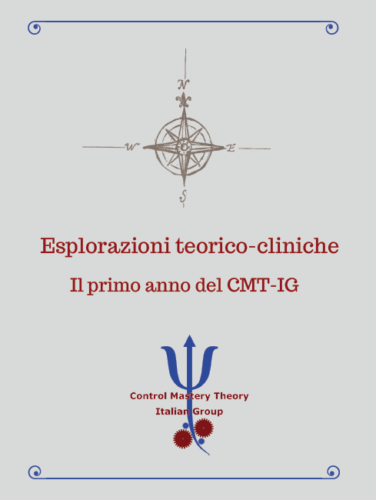
Vuoi saperne di più sulle attività di CMT-IG?
Siamo a tua disposizione per informazioni su corsi, supervisioni e iniziative.
Contattaci ora